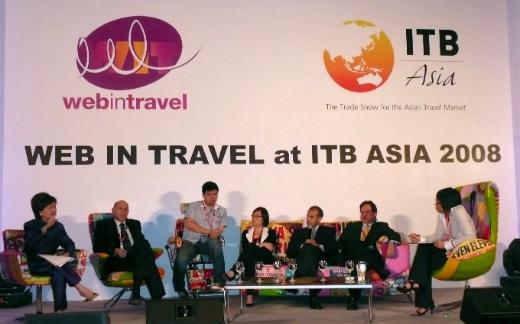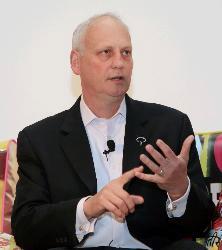ITB Asia Convention: Discussion round on Asia's current hotel situation
Singapore (November 7, 2008). The "Hotel Leaders Forum" (photo) which took place during the ITB Asia two weeks ago is Messe Berlin's first crack at the subject of Hospitality in Asia. Chain and boutique hoteliers made no attempt to deny their insecurities in respect of the current financial crisis; some of their statements were certainly not heard for the first time by crisis weathered Europeans and left a certain feeling of "déjà-vu". But at least the Europeans were clear in their own minds as to the real extent of the problem: Asia is perhaps a little spoiled. Although expected growth has slumped from double to single figures, the rates are still good. Now hoteliers will have to learn to deal with market mechanisms which won't leave Asia unscathed. An expert also reveals trends in current distribution methods.

It was the day after the stop for the second part of the Venetian mega resort in Macau become public and in Singapore the question immediately raised its head as to whether the integrated resort Marina Bay Sands would be affected by the knock-out... Both projects were built by the same owner, Sheldon Adelson, who began his career with the Venetian Las Vegas... Insofar, mild concern was harboured by listeners.
On the podium of the first "ITB Asia Convention" 2008, speakers different to those previously announced on the internet took the stand. Both hosts, Jennie Chua, CEO of Ascott Group, and Yeoh Siew Hoon, Journalist, greeted Miguel Ko as President of Starwood Hotels & Resorts Asia Pacific, Michael Issenberg as Chairman for Accor Asia Pacific, Apo Demirtas as Marketing Boss of the Jumeirah Group in Dubai as well as two representatives from the private/boutique hotel industry: Loh Lik Peng, owner of New Majestic Hotels, Singapore, and Yenn Wong from JIA Boutique Hotels, Hong Kong/Shanghai.
Whilst chain hoteliers now show their concern and begin to review their huge expansion plans and announce losses from business travel in the face of the current crisis, both young private hoteliers with their target group mix of business and leisure sensed sufficient "opportunities". Speakers were agreed that the crisis will bring with it consolidation and will help identify real quality.
Competition starts, all segments begin to flow
Miguel Ko made an appeal for price integrity and indicated "not to want to be the first on the market to reduce rates". Michael Issenberg believes that the internet will assume an important (price) role in the face of falling corporate rates and increased MICE competition. Apo Demirtas as representative of a pure luxury group, on the other hand, predicted business at top levels will be less affected: "Upscale hotels will be more affected by the crisis than the luxury hotels," he said confidently. This was contradicted by his Starwood colleague: "Luxury will be affected because many guests are business travellers and companies are now busy cutting costs."
One finding was accepted by speakers: All segments will begin to flow, they'll affect each other's rates and for this reason, "all sectors will be affected up to a point," Ko said. Direct client contact will become increasingly important. How can the crisis be dealt with in Asia? The suggestions stretched from cost control to more innovating marketing, better incorporation of the internet and the hotel's own CRM up to clearer value for money. Miguel Ko also said what many Europeans think: Even in Asia, the productivity of hotel staff must be improved. As far as guests are concerned, its is hoped that improved products will help in setting the hotels apart from one another and so increasing guest loyalty to the brand.
Technology trends:

Wolf Philip, PhoCusWright
talked about IT trends.
The mobile phone wins ground
In a further 30 minute session, hostess Yeoh Siew Hoon tried to win information on technology trends from CEO of the American travel distribution specialist PhoCusWright (an ITB partner). Philip Wolf warned moving away from one's own area of expertise and aligning oneself all too closely to the emotional needs of the client. "This is dangerous as such as change won't weather a storm," he warned. The (emotionally driven) stock market is an outdated tool, he said, and pointed to the internet and means to global transparency.
Of all IT tools, the expert views the mobile phone as the optimal medium: "Travellers take the information with them on their journeys," he pointed out. "The mobile phone provides information on the city in which the holder currently finds himself and shows special offers." In contrast to PC networks, mobile phone networks can be found easily everywhere and can be used reliably.
Travellers must, however, in future pay closer attention to the PC logic. This, at least, is Philip Wolf's prediction. In future, websites won't be designed for people, or for being read by people, but will be more closely aligned to the language of computers.
Such trends, merely touched upon in Singapore, are documented more comprehensively by PhoCusWright. The company has established, for instance, that the technological "power users" in the USA spend 30 percent more on their trips.
And last but not least, Europe's biggest tour operator, represented by CEO Peter Long from TUI Travel, was expected to give key presentation on the subject of "New Limits for Tour Operators". Long's speech, however, turned out to be little more than a pure PR event for TUI without any real connection to the topic in hand.
The second convention day during the first ITB Asia dedicated its three sessions to the influence of technology on travel, the challenges facing the airline industry and sport as motor of new destination marketing. All in all, 755 ITB guests attended the talk rounds. In Singapore, the convention programme ran between 9 and 11 a.m., with the trade fair events to follow. The form next year's convention programme will take remains open. / Maria Puetz-Willems
To print this article you have to be registered and logged in for newsletter, visitor or subscription.





